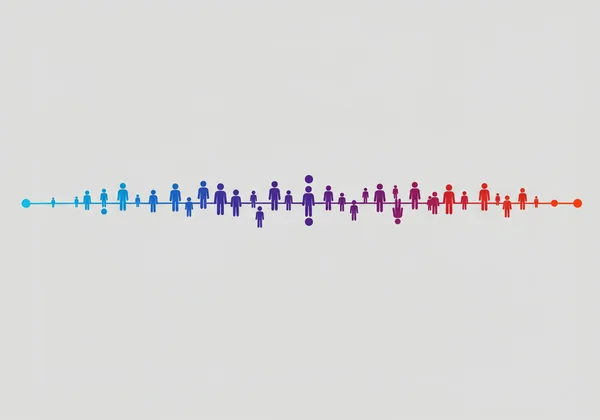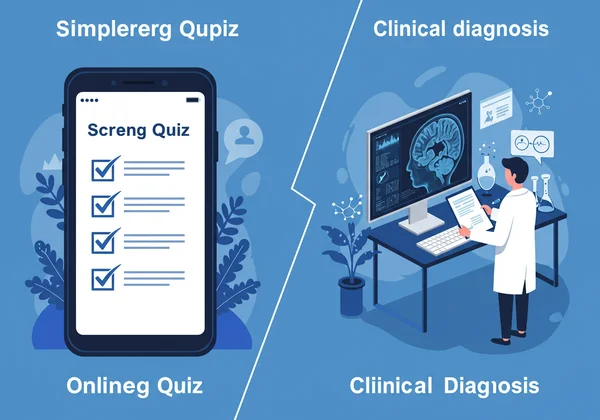Psychopathy Test Score: What Your Results Mean
Feeling curious, or maybe a little anxious, after seeing your psychopathy test score? You're not alone. Getting a number is easy, but understanding what it truly means is the most important step. How do I know if I'm a psychopath? This question often looms large after a result, but the answer is far more nuanced than a simple yes or no. This guide is here to walk you through your results responsibly, explaining what a "spectrum" is, the limitations of any online test, and how you can use this information for powerful self-awareness. Let's decode your score together and turn a number into genuine insight.
The first step in this journey of understanding is knowing where you stand. If you haven't yet, you can explore your traits with our confidential screening tool.
Understanding the Psychopathy Spectrum
The single most important concept to grasp is that psychopathy is not an on/off switch. Modern psychology views these characteristics as existing on a spectrum. Everyone possesses some of these traits to varying degrees. Think of it like height or introversion; people fall all along a continuum, with very few at the absolute extremes. A score on a psychopathy spectrum test simply helps locate where your tendencies might fall on this broad line.

Why Your Score Isn't a "Yes" or "No" Answer
Receiving a score, especially a moderate or high one, can be jarring. However, it's crucial to resist labeling yourself. A test score is not a verdict on your character. Instead, it’s a snapshot of your responses to questions about specific personality traits and behaviors, such as impulsivity, emotional detachment, or a tendency towards manipulation.
These traits can manifest differently depending on your life circumstances, stress levels, and even your mood on the day you took the test. A score is a starting point for reflection, not a final judgment. It is a tool for curiosity, inviting you to look deeper into your personal makeup.
What Different Score Ranges Might Indicate
While we must avoid rigid labels, understanding general score ranges can provide valuable context. It’s important to see these as descriptive guides, not diagnostic categories.
- Low Range: A score in this range typically suggests that you exhibit few of the core traits associated with psychopathy. You likely have strong empathetic responses, value deep emotional connections, and tend to act with careful consideration for others.
- Moderate Range: This is where many people fall. A moderate score might indicate a mix of traits. Perhaps you are highly ambitious and assertive, can detach emotionally to make tough decisions, or are more pragmatic than sentimental. These are not inherently negative qualities; in certain contexts, they can be strengths, such as in leadership or crisis management.
- High Range: A score in the upper range indicates a stronger presence of psychopathic traits. This might manifest as significant challenges with empathy, a pattern of impulsive or risky behavior, and difficulty forming genuine, lasting relationships. It is an invitation to be more mindful of how your actions impact others and to explore these behavioral patterns more deeply.
The Critical Role of Context in Your Results
Your score doesn't exist in a vacuum. Who you are is a complex tapestry woven from your genetics, upbringing, life experiences, and personal choices. An online test cannot possibly capture this rich context. For instance, a person who grew up in a highly competitive environment might develop traits like ruthlessness as a survival mechanism, which could inflate their score.
Therefore, the most productive way to view your result is as a single piece of data. It’s a clue, not a conclusion. True self-awareness comes from integrating this information with a holistic understanding of your own life story, your values, and your intentions.
Key Limitations of an Online Psychopathy Test
To use this tool responsibly, we must be transparent about its limitations. Our goal with this psychopathy test is to provide an educational resource for insight, not a replacement for professional assessment. Any online psychopathy test is, by its very nature, a preliminary screening instrument.
Screening Tool vs. Clinical Diagnosis: A Vital Distinction
This is the most critical point: our test is a screening tool, not a diagnostic one. A formal clinical diagnosis of a personality disorder can only be made by a qualified mental health professional, such as a psychologist or psychiatrist. Such a diagnosis involves comprehensive interviews, a review of personal history, and often the use of validated, multi-faceted instruments like the Hare Psychopathy Checklist-Revised (PCL-R).
Our scientifically-inspired test can point towards potential areas for self-exploration, but it cannot and should not be used to self-diagnose or diagnose others. Think of it as a smoke detector: it alerts you to the possible presence of something that warrants a closer look, but it takes a firefighter to assess the situation and determine the true nature of the fire.

How Our AI-Powered Report Offers Deeper Insight
The initial free score you receive is a valuable starting point. However, it’s a single data point. This is where our unique AI-Powered Report comes in. It moves beyond the number to provide the nuance and personalization that a simple score lacks.
The AI analyzes your unique pattern of answers to create a comprehensive profile. It doesn't just tell you if you have certain traits; it explores how they might manifest in your life. The report details your potential strengths (like resilience or focus under pressure), identifies your personal challenges, explains their likely impact on your daily life, and provides actionable suggestions for growth. If you want to move from a simple number to a meaningful narrative, you can get your AI report.
What to Do After Reviewing Your Test Score
So, you have your score and you understand its context and limitations. What now? The next step is to use this information constructively to enhance your life and relationships.
Using Your Results for Self-Awareness and Growth
Your results are a powerful catalyst for self-reflection. Regardless of your score, you can ask yourself powerful questions. Where do these traits show up in my life? Do they serve me well, or do they create friction in my relationships or career? Understanding these patterns is the first step toward intentional change.

For instance, if your score suggests a low level of empathy, you could consciously practice perspective-taking in your daily interactions. If it points to high impulsivity, you could develop strategies for pausing and reflecting before making significant decisions. This is an opportunity to take control of your personal development and become a more effective, self-aware individual. If you're ready to start this journey, take the test today.
When and How to Seek Professional Guidance
For some, a test score can bring up significant distress or confirm long-held worries about their behavior. If your results cause you anxiety, or if you feel your traits are negatively impacting your life or the lives of others, this is a clear sign that it’s time to seek professional guidance.
Consulting a licensed therapist or counselor is an act of strength and self-care. A professional can provide a safe space to explore these issues, offer a formal assessment if needed, and help you develop effective coping strategies. They can provide personalized support that no online tool can match.
You’ve taken a courageous step by seeking to understand your personality traits. Remember, a score is not a label—it's a data point. The real power comes from what you do next. Whether you use our personalized AI report to explore your unique strengths and challenges or decide it's time to speak with a professional, you are now in a better position to navigate your life with greater self-awareness.
Frequently Asked Questions About Psychopathy Test Scores
Can a psychopathy test be wrong or inaccurate?
Yes, any self-report test has limitations. The accuracy depends on your honesty, self-awareness, and even your mood. An online test is best viewed as a reliable indicator or a preliminary screening tool, not an infallible measure. It's designed to highlight tendencies that may warrant further reflection, but it is not a clinical diagnosis.
What is the difference between a psychopath and a sociopath?
While often used interchangeably, many experts make a distinction. Psychopathy is often thought to have stronger genetic or biological roots, characterized by a profound lack of empathy and calculated, charming manipulation. Sociopathy is often seen as being more influenced by one's environment (like a traumatic upbringing), with individuals being more impulsive, erratic, and capable of forming some attachments. Our sociopath test provides insights into these related but distinct traits.
If I score high, can I still be a good person?
Absolutely. A test score measures traits, not your moral character or your worth as a human being. Many traits associated with psychopathy, such as fearlessness or focus, can be channeled into pro-social and highly successful careers. Being a "good person" is defined by your actions and choices, not by a predisposition. Understanding your traits simply gives you more power to choose your actions wisely. For a deeper understanding of your personal traits, start your test now.